一般现在时实义动词 小学版
一般现在时实义动词-小学版

一般现在时〔小学版〕测试题〔时间40分钟,总分值100分〕姓名:成绩:一、请写出以下动词的第三人称单数形式〔每题1分,共15分〕1. work_______2. watch_________3. clean________4. write_______5. teach_______6. wash_______7. have_______8.read________9. go_________ 10. do__________ 11. fly________ 12. study_______13.walk________14.see________ 15.pass_________二、选择〔每题2分,共20分〕( ) 1. _____ you have a book?A. DoB. AreC. IsD. Have( ) 2. They _________ on a farm.A. workingB. is workC. workD. is worked( ) 3. Does Peter like to watch TV? __________.A. Yes, he likeB. No, he doesn’tC. Yes, he’d likeD. No, he likes( ) 4. She doesn’t __________ her homework in the afternoon.A. doingB. to doC. doesD. do( ) 5.How ____________ Mr. Brown ___________ to America?A. do,goB. is,goC. does,goD. does,goes( ) 6.Where’s my camera? I____________ it.A. am not findingB. am not seeingC. can’t findD. can’t look at( ) 7. How ___________ he go to work?He ___________ to work by bike.A. does goB. do;goesC. do goD. does;goes( ) 8. ______ you usually late for school? No, _____________.A. Do I amB. Does notC. Are I’m notD. Are I aren’t( ) 9. _____ she _____ home at six every day?A. Is , leaveB. Does , leaveC. Is , leavesD. Does , left( ) 10. Mr. Yang ____________ English this term.A. teaches ourB. teaches usC. teachs usD. teach our三、用do或does的适当形式填空〔每空1分,共10分〕1. _____ you ride a bike to school? Yes, I ________.2. ______ your sister like PE? No, she ________.3. What_______ the students have? They have some pens.4. How_______ Linda go to school? She goes to school on foot.5. He _______ not speak English. He speaks Chinese.6. _______ they watch TV on Sundays? Yes, they _______.7. My father and mother ______ not read newspapers on Saturday.四、用动词的适当形式填空〔每题2分,共20分〕1.I like ____________ (swim).2.He _________(read) English every day.3.We _________(go) to school at seven in the morning.4.Mike________(go) to school at seven in the morning.5.My mother________(like) ______(go) shopping.6.I can ________(draw) many beautiful pictures.7.She_________(make) a model plane.8.Do you ________(like)_________(run)?9.Does he_________(like)_________(jump) ?10.Does Nancy_________(grow) flowers on Saturday ?五、改句子〔每题2分,共20分〕1.Do you often play football after school? (肯定答复)2.Gao Shan's sister likes playing table tennis. 〔改为否认句〕3.She lives in a small town near New York. 〔改为一般疑问句〕4.We have four lessons.〔否认句〕5.Nancy doesn't run fast. 〔肯定句〕6.My dog runs fast.否认句:一般疑问句:7.Mike has two letters for him.一般疑问句:否认句:8.I usually play football on Friday afternoon.否认句:一般疑问句9.Su Yang usually washes some clothes on Saturday.否认句:一般疑问句10.Tom does his homework at home.否认句:一般疑问句六、划出错误的地方,将正确的写在横线上〔每题1分,共5分〕1. Is your brother speak English? __________________2. Does he likes going fishing? __________________3. He likes play games after class. __________________4. Mr. Wu teachs us English. __________________5. She don’t do her homework on Sundays. ___________________。
小学英语语法集训2-一般现在时(含实义动词)

语法集训资料2一般现在时(含有实义动词)(一)行为动词:及实义动词,表示具体动作的动词。
句型变换口诀:一般现在时,没有be动词;无be找助,助提前,动还原。
(二)第三人称单数变化规则:1)一般情况下,动词后面直接加 -s。
eg:work-works get-gets say-says read- reads2)以ch,sh,s,x或o结尾的动词,在后面加 -es。
口诀:以蛇(S)吃(Ch)烈酒(XO)晕死了(Sh)eg : go-goes teach-teaches wash-washes do-does fix -fixes3)以“辅音+y”结尾的动词,改y为i加es。
eg: study- studies try-tries carry-carries fly-flies cry-cries(三)三单:概念:指第三人称单数,he,she,it或者能够被he,she,it代替的单数名词。
eg: my brother, Lily, his mother练一练:一、用所给词的正确形式填空1. We often___________(play) on the playground.2. He _________(get) up at six o’clock.3. Danny _______(study) English, Chinese, Maths, Science and Art at school.4. Mike sometimes __________(go) to the park with his sister.5. At eight at night, she ________(watch) TV with his parents.6.What____ (do) he usually _____(do) after school?7.__________you _________(brush) your teeth every morning?8.________ Mike________(read) English every day?9. How many lessons ______your classmate____(have) on Monday?10. What time _______ his mother _________(do) the housework?二、改句子1. Do you often play football after school? (肯定回答)___________________________________________________________ 2. I have many books. (改为否定句)____________________________________________________________ 3. Lucy’s sister likes playing table tennis. (改为否定句)____________________________________________________________ 4. She lives in a small town near New York. (改为一般疑问句)_____________________________________________________________ 5. She watches TV every day. (否定句)———————————————————————————6.David has a goal. (改为一般疑问句)————————————————————————————三、写出下列动词的第三人称单数形式:1. wash_________ match _______guess______ study______ finish_________ go________ snow______ carry_________2. stop______ see________ drive ________let_______ carry______ keep_____ join______ find_______ think________ teach______ catch______四、单项选择:1. He sits down and ______ a rest.A. havingB. haveC. to haveD. has2. The picture _______ nice.A. looksB. is lookedC. lookD. is looking3. She ______ down and soon falls asleep.A. liveB. lainC. laidD. sits6. The plane ______ over there.A. isB. areC.amD. was4. The teacher ________us to come to school on time.A. askB. askingC. asksD. asked5. John always ______ others.A. helpB. helpingC. helpsD. to help6. He ______for eight hours every day.A. workingB. to workC. worksD. worked五、改错1. Is your brother speak English?————————————————————————2.Does he likes going fishing?_____________________________________________________________ 3. He likes play games after class._____________________________________________________________4. Mr. Wu teachs us English.______________________________________________________________ 5. She don’t do her homework every evening.______________________________________________________________。
小学的归纳与解析常用动词的时态变化规则
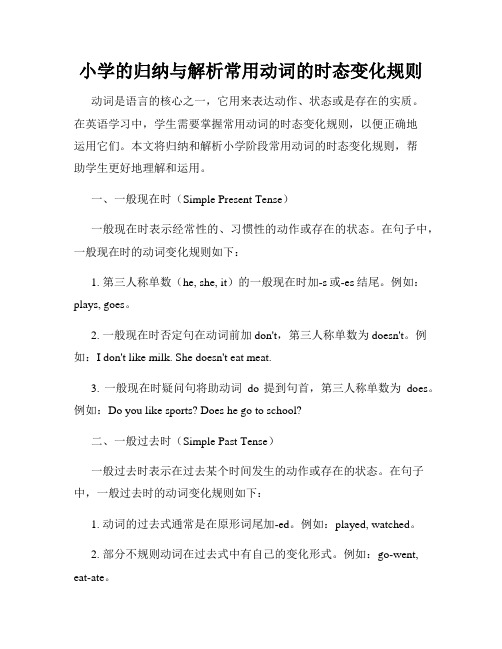
小学的归纳与解析常用动词的时态变化规则动词是语言的核心之一,它用来表达动作、状态或是存在的实质。
在英语学习中,学生需要掌握常用动词的时态变化规则,以便正确地运用它们。
本文将归纳和解析小学阶段常用动词的时态变化规则,帮助学生更好地理解和运用。
一、一般现在时(Simple Present Tense)一般现在时表示经常性的、习惯性的动作或存在的状态。
在句子中,一般现在时的动词变化规则如下:1. 第三人称单数(he, she, it)的一般现在时加-s或-es结尾。
例如:plays, goes。
2. 一般现在时否定句在动词前加don't,第三人称单数为doesn't。
例如:I don't like milk. She doesn't eat meat.3. 一般现在时疑问句将助动词do提到句首,第三人称单数为does。
例如:Do you like sports? Does he go to school?二、一般过去时(Simple Past Tense)一般过去时表示在过去某个时间发生的动作或存在的状态。
在句子中,一般过去时的动词变化规则如下:1. 动词的过去式通常是在原形词尾加-ed。
例如:played, watched。
2. 部分不规则动词在过去式中有自己的变化形式。
例如:go-went, eat-ate。
3. 一般过去时否定句在动词前加didn't。
例如:I didn't see her yesterday.4. 一般过去时疑问句将助动词did提到句首。
例如:Did you finish your homework?三、一般将来时(Simple Future Tense)一般将来时表示将来某个时间要发生的动作或存在的状态。
在句子中,一般将来时的动词变化规则如下:1. 在动词后面加上助动词will。
例如:I will go to the park tomorrow.2. 动词原形词尾加上shall(第一人称)或will(其他人称)。
一般现在时
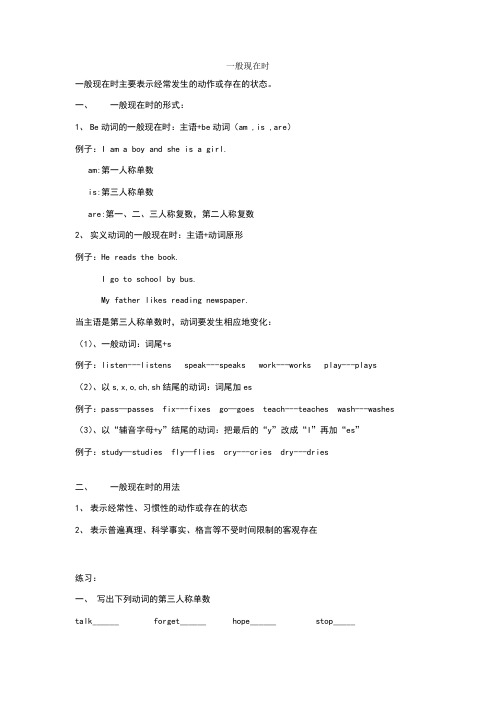
一般现在时一般现在时主要表示经常发生的动作或存在的状态。
一、一般现在时的形式:1、Be动词的一般现在时:主语+be动词(am ,is ,are)例子:I am a boy and she is a girl.am:第一人称单数is:第三人称单数are:第一、二、三人称复数,第二人称复数2、实义动词的一般现在时:主语+动词原形例子:He reads the book.I go to school by bus.My father likes reading newspaper.当主语是第三人称单数时,动词要发生相应地变化:(1)、一般动词:词尾+s例子:listen---listens speak---speaks work---works play---plays (2)、以s,x,o,ch,sh结尾的动词:词尾加es例子:pass—passes fix---fixes go—goes teach---teaches wash---washes (3)、以“辅音字母+y”结尾的动词:把最后的“y”改成“I”再加“es”例子:study—studies fly—flies cry---cries dry---dries二、一般现在时的用法1、表示经常性、习惯性的动作或存在的状态2、表示普遍真理、科学事实、格言等不受时间限制的客观存在练习:一、写出下列动词的第三人称单数talk______ forget______ hope______ stop_____perform______ play______ say______ buy______ worry______ fly______ study_______ like_______ make______ take______love_______ recite_______ become_______ come_______ drive_______ shine_______leave_____ wake_______ ride_______ write_______ hike______give______ see______ swim______ stop______ shop_______ plan______ get______ sit_______ let_______ cut_______run_______ forget_______ begin_______ wash_____ watch_______ finish______ teach_____ fish_______ reach_______ go_______ do_____二、用括号内动词的适当形式填空。
小学英语一般现在时

3. My birthday is on July 1st. Is your birthday on July 1st? When is your birthday?
--The birds don't fly . --The bird doesn't fly.
03
一般疑问句及回答
一般疑问句及回答
Do
+主语 (非单三)
+动词(短 语)原形
+其他?
肯定回 答
Do
you/they /we
like
apples?
Ye s , I / t hey/w e do.
Does
一般现在时
一般现在时分为两种:
一是含有be动词的一般现在时
二是含有实义动词的一般现在时
常
见
的 1. be动词:be动词是对am,is,are的统称
两
种
2. 实义动词:有实际意义的动词。eg:walk(走) swim(游泳)
run(跑)
动 动词还有其他的分 词 类,比如系动词、
助动词等,今天我
们只学习这两种。
2.含有实义动词的一般现在时 经常出现often、usually、sometimes这类的词
01. 肯定句 02. 否定句 03. 一般疑问句 04. 特殊疑问句
01
肯
定
句
主语(非 单三)
I/They
主语(单 三)
She/He
肯定句句子结构
+动词(短语)原形
+其他。
小学生一般现在时讲解及练习题
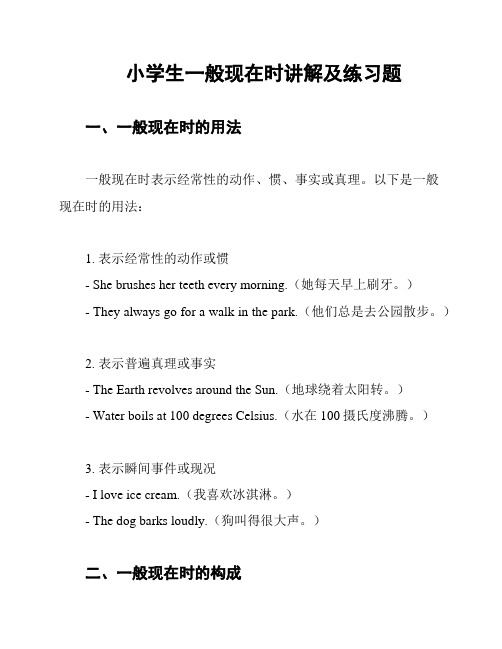
小学生一般现在时讲解及练习题一、一般现在时的用法一般现在时表示经常性的动作、惯、事实或真理。
以下是一般现在时的用法:1. 表示经常性的动作或惯- She brushes her teeth every morning.(她每天早上刷牙。
)- They always go for a walk in the park.(他们总是去公园散步。
)2. 表示普遍真理或事实- The Earth revolves around the Sun.(地球绕着太阳转。
)- Water boils at 100 degrees Celsius.(水在100摄氏度沸腾。
)3. 表示瞬间事件或现况- I love ice cream.(我喜欢冰淇淋。
)- The dog barks loudly.(狗叫得很大声。
)二、一般现在时的构成在一般现在时中,动词的变化相对简单。
1. 对于第三人称单数(He/She/It),动词要加-s或-es。
- He walks to school every day.(他每天走路去学校。
)- She eats an apple.(她吃一个苹果。
)- It runs fast.(它跑得很快。
)2. 对于其他人称(I/You/We/They),动词不变。
- I play soccer on weekends.(我周末踢足球。
)- You read books every night.(你每晚读书。
)- We go swimming in summer.(我们夏天去游泳。
)- They watch movies together.(他们一起看电影。
)三、练题请根据句意填入正确的动词形式。
1. My mother __________ (cook) dinner for us every evening.2. Tom and Lisa __________ (play) tennis on Saturdays.3. The sun __________ (rise) in the east.4. We __________ (study) English at school.5. Dogs __________ (bark) when they see strangers.1. cooks2. play3. rises4. study5. bark希望以上讲解和练习题对你有帮助!。
小学一般现在时实义动词

变否定句。
添加标题
He wants a book.
添加标题
Jimmy washes hands before dinner.
添加标题
Lisa likes milk very much.
添加标题
They walk to school.
添加标题
Lingling and Dandan are 10 years old.
They walk to school.
添加标题
Lingling and Dandan are 10 years old.
添加标题
I am Chinese.
添加标题
Ben is from America.
添加标题
感谢各位的观看
FOR WATCHING
(3)动词末尾y前为辅音:将y改为i加es:
study→studies fly→flies carry→carries cry→cries
但在y前如果为元音则直接加s
buys says
runs gets likes takes plays climbs
(1)多数动词直接加s:
添加标题
I am Chinese.
添加标题
Ben is from America.
添加标题
二、变一般疑问句并作肯定和否定回答。
He wants a book.
添加标题
Jimmy washes hands before dinner.
添加标题
Lisa likes milk very much.
添加标题
We study English.我们学习英语
I am a boy.我是一个男孩。
当主语为第三人称单数(he, she,it)时,要在动词后加"-s"或"-es"。
2020年六年级英语一般现在时-实义动词讲解

用法
1.一般现在时时常和every day, always, usually, often, sometimes, on weekends, on Sundays, never等时间副词连用;
2.一般现在时中的动词要随主语人称的变化而变化。
一般现在时
❤一般现在时:①表示_______发生的动作或存在的状态。如:We go to school every day.
②表示_______的能力、特征、职业。如:Iam a student.
③表示普遍_______或_______事实。如:One and one is two.1+1=2
❤实义动词:实实在在有意思的动词。
知识要点
核心内容
含有实义动词的一般现在时
句型结构
1.肯定形式:主语+V.(原形)或V. -s/ -es+其他成分.
如:I get up at six o’clock every day.
Li Lei does homework on Sundays.
2.否定形式:主语+don’t/ doesn’t+V.(原形)+其他成分.
二、写出下列动词的第三人称单数形式。
like____________
eat____________
play____________
go____________
do____________
watch____________
wash____________
fix____________
study___________词尾-s;如:play–plays;dance - dances
(完整版)小学六年级英语四种时态复习
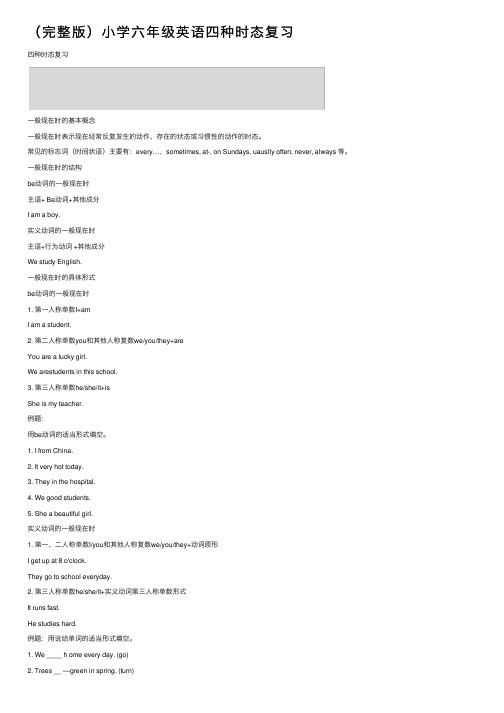
(完整版)⼩学六年级英语四种时态复习四种时态复习⼀般现在时的基本概念⼀般现在时表⽰现在经常反复发⽣的动作、存在的状态或习惯性的动作的时态。
常见的标志词(时间状语)主要有:every…,sometimes, at-, on Sundays, uauslly often, never, always 等。
⼀般现在时的结构be动词的⼀般现在时主语+ Be动词+其他成分I am a boy.实义动词的⼀般现在时主语+⾏为动词 +其他成分We study English.⼀般现在时的具体形式be动词的⼀般现在时1. 第⼀⼈称单数I+amI am a student.2. 第⼆⼈称单数you和其他⼈称复数we/you/they+areYou are a lucky girl.We arestudents in this school.3. 第三⼈称单数he/she/it+isShe is my teacher.例题:⽤be动词的适当形式填空。
1. I from China.2. It very hot today.3. They in the hospital.4. We good students.5. She a beautiful girl.实义动词的⼀般现在时1. 第⼀、⼆⼈称单数I/you和其他⼈称复数we/you/they+动词原形I get up at 8 o'clock.They go to school everyday.2. 第三⼈称单数he/she/it+实义动词第三⼈称单数形式It runs fast.He studies hard.例题:⽤说给单词的适当形式填空。
1. We ____ h ome every day. (go)2. Trees __ —green in spring. (turn)3. He ____ very hard. (study)4. The boy - ___ up at seven O'clock. (get)5. The earth ____ round the sun. (move)补充:主语为第三⼈称单数形式,谓语动词的变化规则:般现在时的句型变化 be 动词的⼀般现在时否定句主语 + be 动词 + not +其他He is not a worker.特殊疑问句特殊疑问词 + ⼀般疑问句Where is he?例题:写出下列句⼦中所缺的be 动词,并⽤肯定及否定形式回答。
一般现在时-实意动词 练习

Lesson8一般现在时(含实义动词)every day◆一、填空。
1.第三人称单数主语,简称“”。
口诀:2.一般现在时肯定句中,遇到三单主语,后面的动词3.助动词do/does/don’t/doesn’t+实义动词的4.动词三单形式的变化规则并举例:含实义动词,主语是三单形式的句型转换:1.肯定句结构:例句:2.否定句结构:例句:3.一般疑问句结构:例句:口诀:1.肯变否:2.肯变疑:3.回答:二、写出下列动词的第三人称单数。
drink________go_______fly________run________ make________pass_______carry________brush________ come________study_______watch______catch________ do_________teach_______sit________stay________ have_______plant_______play________pick________ cry_______take_______tie_______like_______ ride_______paint_______speak_______live_______三、圈出正确的答案。
1.She(like/likes)to play football.2.He(like/likes)drinking milk.3.I(like/likes)to watch TV.4.We(like/likes)to play badminton.5.They(like/likes)to sing songs.6.She(read/reads)books every day.7.He(play/plays)computer games every day.8.It(listen/listens)to the radio every day.9.Linda(draw/draws)pictures every day.10.Jane and Linda(play/plays)football every day.四、肯定句填空。
一般现在时之实义动词
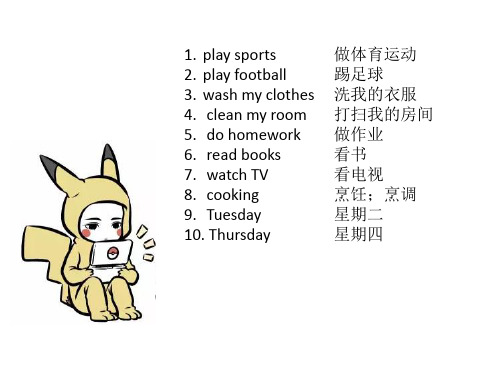
play football
What do you often do on the weekend?
wash my clothes
What do you often do on the weekend?
clean my room
是第三人称单数。
单数可数名词或"this / that / the+单数可数 名词"作主语时,是第 三人称单数。
标志词
频率副词
always
often
usually sometimes
Become increasingly infrequent
rarely
seldom
never
标志词
every
day month year week morning afternoon evening
那我还要变一般疑问句呢?
看我魔法啦!
实义动词
助动词
Nina has short hair and two big eyes.
Does Nina have short hair and two big eyes?
试着说下步骤?
1.先找动词,如果动词是be动词或者 情态动词直接提前并大写
2.如果动词是实义动词,就看人称是不 是三单
否定句: My mother doesn't go to school by bus. 一般疑问句:Does your mother go to school by bus? 肯定回答: Yes, she does. 否定回答: No, she doesn’t.
They go on a picnic on the weekend.
小学英语一般现在时详细讲解

2. be 动词的一般现在时的基本句型
☺肯定句:主语+be+其它
如: He is a worker.
You are thirteen.
☺否定句:主语+ ຫໍສະໝຸດ e+ not+其它
☺Does+主语(he/she/it)+动词原形+其他? 如:Does he stay at home on Saturdays? Yes,he does./No,he doesn’t. Does Lucy have sports every day? Yes,he does./No,he doesn’t.
2) My father go to work by bike everyday. 对划线部分提问: How does your father go to work everyday?
一般现在时
(否定句)
在一般现在时中,句 中有be动词或情态动词 (can等)时,否定句在 be动词和情态动词后加 not。 例如
总结--一般现在时: 句子类型:
一.主系表(主语+be动词+其他) 肯:主语+be动词(am,is,are)+其他. 否:主语+be动词+not+其他. 一般疑问:be+主语+其他? 特殊疑问:特殊疑问词+一般疑问句? 二.主谓宾(主语+实意动词+其他) 肯:主语+实意动词(原形/三单形式)+其他. 否:主语+don’t/doesn’t+实意动词+其他. 一般疑问:Do/Does+主语+实意动词(原形)+其他? 特殊疑问:特殊疑问词+一般疑问句?
小学的四大时态知识点总结
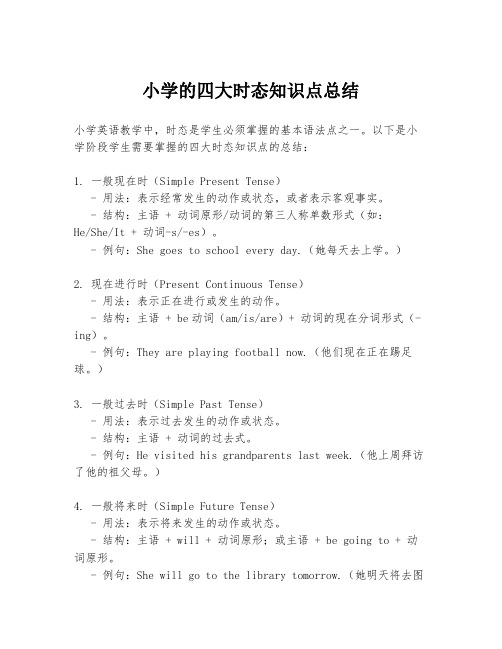
小学的四大时态知识点总结小学英语教学中,时态是学生必须掌握的基本语法点之一。
以下是小学阶段学生需要掌握的四大时态知识点的总结:1. 一般现在时(Simple Present Tense)- 用法:表示经常发生的动作或状态,或者表示客观事实。
- 结构:主语 + 动词原形/动词的第三人称单数形式(如:He/She/It + 动词-s/-es)。
- 例句:She goes to school every day.(她每天去上学。
)2. 现在进行时(Present Continuous Tense)- 用法:表示正在进行或发生的动作。
- 结构:主语 + be动词(am/is/are)+ 动词的现在分词形式(-ing)。
- 例句:They are playing football now.(他们现在正在踢足球。
)3. 一般过去时(Simple Past Tense)- 用法:表示过去发生的动作或状态。
- 结构:主语 + 动词的过去式。
- 例句:He visited his grandparents last week.(他上周拜访了他的祖父母。
)4. 一般将来时(Simple Future Tense)- 用法:表示将来发生的动作或状态。
- 结构:主语 + will + 动词原形;或主语 + be going to + 动词原形。
- 例句:She will go to the library tomorrow.(她明天将去图书馆。
)掌握这些基本时态对于小学生来说至关重要,它们是构建句子和表达思想的基础。
在学习过程中,学生应该通过大量的练习和实际应用来加深对这些时态的理解和运用。
同时,老师和家长也应该鼓励学生在日常生活中使用英语,以提高他们的语言能力。
通过不断的练习和应用,学生将能够更加熟练地掌握这些时态,并在英语交流中更加自信。
五年级一般现在时的知识点归纳

五年级一般现在时的知识点归纳一、一般现在时的概念。
一般现在时表示经常的、习惯性的动作或存在的状态。
例如:I often play football on Sundays.(我经常在周日踢足球,表示经常做的动作);He is a student.(他是一名学生,表示存在的状态)二、一般现在时的构成。
1. be动词(am/is/are)- 当主语是I时,be动词用am。
例如:I am a girl.- 当主语是第三人称单数(he/she/it/单个人名、单个事物等)时,be动词用is。
例如:He is my brother. The cat is cute.- 当主语是you/we/they/复数名词时,be动词用are。
例如:You are my friends. They are students.2. 实义动词(行为动词)- 当主语是第三人称单数(he/she/it/单个人名、单个事物等)时,动词要变成第三人称单数形式(动词原形 + s/es)。
- 一般情况加s,如:like - likes,play - plays。
- 以s、x、ch、sh、o结尾的动词加es,如:go - goes,watch - watches。
- 以辅音字母 + y结尾的动词,把y变为i再加es,如:study - studies。
- 当主语是I/you/we/they/复数名词时,动词用原形。
例如:I like apples. They play basketball.三、一般现在时的时间状语。
1. 表示频率的副词:always(总是)、usually(通常)、often(经常)、sometimes(有时)、seldom(很少)、never(从不)。
例如:He always gets up early.2. 时间短语:on Sundays(在周日)、every day(每天)、in the morning (在早上)等。
小学英语语法详解时态--一般现在时
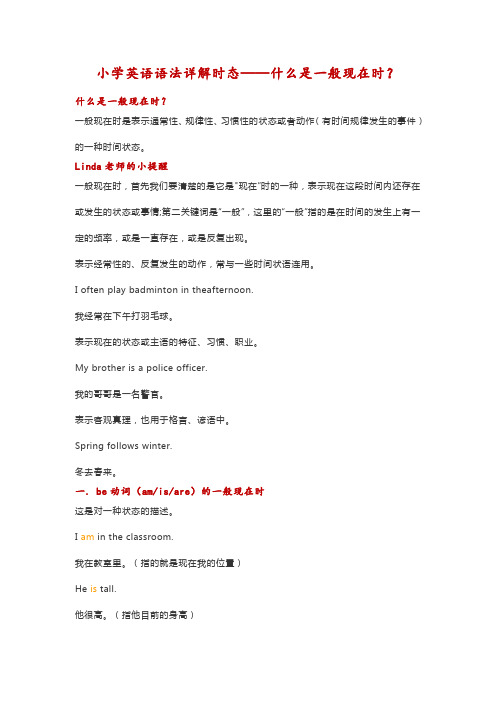
小学英语语法详解时态——什么是一般现在时?什么是一般现在时?一般现在时是表示通常性、规律性、习惯性的状态或者动作(有时间规律发生的事件)的一种时间状态。
Linda老师的小提醒一般现在时,首先我们要清楚的是它是"现在”时的一种,表示现在这段时间内还存在或发生的状态或事情;第二关键词是“一般”,这里的“一般”指的是在时间的发生上有一定的频率,或是一直存在,或是反复出现。
表示经常性的、反复发生的动作,常与一些时间状语连用。
I often play badminton in theafternoon.我经常在下午打羽毛球。
表示现在的状态或主语的特征、习惯、职业。
My brother is a police officer.我的哥哥是一名警官。
表示客观真理,也用于格言、谚语中。
Spring follows winter.冬去春来。
一. be动词(am/is/are)的一般现在时这是对一种状态的描述。
I am in the classroom.我在教室里。
(指的就是现在我的位置)He is tall.他很高。
(指他目前的身高)We are happy.我们很快乐。
(指现在我们的感觉)小学英语语法详解时态——实义动词的一般现在时什么是一般现在时?一般现在时是表示通常性、规律性、习惯性的状态或者动作(有时间规律发生的事件)的一种时间状态。
二.实义动词的一般现在时1.基本句型:I do…(do指代实义动词)I run every day.我每天跑步。
I go to the park on Sundays.我每周日去公园。
I see a flower.我看到一朵花。
(这里的run,go,see就是实义动词,在句中用原形。
)2. 一般疑问句:Do you…?陈述句:I see the rainbow.我看见彩虹。
一般疑问句:Do you see the rainbow?你看到彩虹吗?陈述句:I like my journey.我喜欢这次旅行。
小学英语“一般现在时”知识点总结

Fill the blanks 1、I __a_m__ a teacher. 2、She __is___ three years old. 3、She _is__ _n_ot_ a student. 4、They _a_r_e_ _n_o_t_ in the classroom. 5、_I_s__ he a policeman?
一般现在时(The Simple Present Tense)
1.表示现在的状态: e.g. He is twelve. She is at work.
2.表经常或习惯性的动作: e.g. I get up at 6:30 every day.
He often goes to the English corner. 3.表主语具备的性格和能力等:
结构
1. 谓语是be动词: 肯定句:主语+be动词+其他 否定句:主语+be动词+not+其他 一般疑问句:Be动词+主语+其他 特殊疑问句:特殊疑问词+be动词+主语+其他 如: He is Jim’s father. He is not (isn’t) Jim’s father. Is he Jim’s father? Who is he ?
如: (1)I watch TV in the evening.
I don’t watch TV in the evening.
Do you watch TV in the evening?
Yes, I do./ No, I don’t.
What do you do in the evening?
(2)He likes collecting stamps.
一般现在时态下的实意动词

谓语篇之实意动词一般现在时态下的实意动词一、哪些词是实意动词?表示实际动作含义的词就是实意动词,常见的实意动词有:have、like、do、eat、play 等等二、实意动词常用的两种形式1、动词原形2、动词的单三人称形式三、动词原形如何变成动词的单三人称形式?1、规则变化:①直接加s ②以s、x、sh、ch、o结尾的直接加es ③辅音字母加y结尾的把y变为i再加es2、不规则变化:have的单三人称形式是has四、什么时候用动词原形?什么时候用动词的单三人称形式?1、从人称代词的角度(人称代词作主语)第三人称单数(he she it)后用单三第一人称单复数(I we)、第二人称单复数(you)和第三人称复数(they)后用动词原形如:I have a book. 我有一本书。
She likes blue. 她喜欢蓝色。
2、从名词的数的角度(名词作主语)可数名词单数、不可数名词后用单三可数名词复数后用原形如:Tom likes red. 汤姆喜欢红色。
Tom and Amy like green. 汤姆和艾米都喜欢绿色。
五、含有实意动词的句型转换1、肯定句变成否定句①需要借助助动词don’t或doesn’t②助动词don’t或doesn’t要放在实意动词的前面③当原肯定句中是动词原形时,选用助动词don’t;当原肯定句中是单三时,选用助动词doesn’t④当出现助动词时实意动词必须还原为动词原形2、肯定句变成一般疑问句①需要借助助动词Do或Does②助动词Do或Does要放在句首③当原肯定句中是动词原形时,选用助动词Do;当原肯定句中是单三时,选用助动词Does④当出现助动词时实意动词必须还原为动词原形3、对一般疑问句进行的肯定回答Yes, 主语+do/does(主语必须用人称代词主格来代替,如:I、we、she、he、it、they)4、对一般疑问句进行的否定回答No, 主语+don’t/doesn’t(主语必须用人称代词主格来代替,如:I、we、she、he、it、they)注:don’t=do not doesn’t=does not如:肯定句:I play basketball after school.我放学后打篮球。
- 1、下载文档前请自行甄别文档内容的完整性,平台不提供额外的编辑、内容补充、找答案等附加服务。
- 2、"仅部分预览"的文档,不可在线预览部分如存在完整性等问题,可反馈申请退款(可完整预览的文档不适用该条件!)。
- 3、如文档侵犯您的权益,请联系客服反馈,我们会尽快为您处理(人工客服工作时间:9:00-18:30)。
一般现在时(小学版)测试题
(时间40分钟,满分100分)
姓名:成绩:
一、请写出下列动词的第三人称单数形式(每题1分,共15分)
1. work_______
2. watch_________
3. clean________
4. write_______
5. teach_______
6. wash_______
7. have_______
8.read________
9. go_________ 10. do__________ 11. fly________ 12. study_______
13.walk________14.see________ 15.pass_________
二、选择(每题2分,共20分)
( ) 1. _____ you have a book?
A. Do
B. Are
C. Is
D. Have
( ) 2. They _________ on a farm.
A. working
B. is work
C. work
D. is worked
( ) 3. Does Peter like to watch TV? __________.
A. Yes, he like
B. No, he doesn’t
C. Yes, he’d like
D. No, he likes
( ) 4. She doesn’t __________ her homework in the aft ernoon.
A. doing
B. to do
C. does
D. do
( ) 5.How ____________ Mr. Brown ___________ to America?
A. do,go
B. is,go
C. does,go
D. does,goes
( ) 6.Where’s my camera? I____________ it.
A. am not finding
B. am not seeing
C. can’t find
D. can’t look at
( ) 7. How ___________ he go to work?
He ___________ to work by bike.
A. does go
B. do;goes
C. do go
D. does;goes
( ) 8. ______ you usually late for school? No, _____________.
A. D o I am
B. Does not
C. Are I’m not
D. Are I aren’t
( ) 9. _____ she _____ home at six every day?
A. Is , leave
B. Does , leave
C. Is , leaves
D. Does , left
( ) 10. Mr. Yang ____________ English this term.
A. teaches our
B. teaches us
C. teachs us
D. teach our
三、用do或does的适当形式填空(每空1分,共10分)
1. _____ you ride a bike to school? Yes, I ________.
2. ______ your sister like PE? No, she ________.
3. What_______ the students have? They have some pens.
4. How_______ Linda go to school? She goes to school on foot.
5. He _______ not speak English. He speaks Chinese.
6. _______ they watch TV on Sundays? Yes, they _______.
7. My father and mother ______ not read newspapers on Saturday.
四、用动词的适当形式填空(每题2分,共20分)
1.I like ____________ (swim).
2.He _________(read) English every day.
3.We _________(go) to school at seven in the morning.
4.Mike________(go) to school at seven in the morning.
5.My mother________(like) ______(go) shopping.
6.I can ________(draw) many beautiful pictures.
7.She_________(make) a model plane.
8.Do you ________(like)_________(run)?
9.Does he_________(like)_________(jump) ?
10.Does Nancy_________(grow) flowers on Saturday ?
五、改句子(每题2分,共20分)
1.Do you often play football after school? (肯定回答)
2.Gao Shan's sister likes playing table tennis. (改为否定句)
3.She lives in a small town near New York. (改为一般疑问句)
4.We have four lessons.(否定句)
5.Nancy doesn't run fast. (肯定句)
6.My dog runs fast.
否定句:
一般疑问句:
7.Mike has two letters for him.
一般疑问句:
否定句:
8.I usually play football on Friday afternoon.
否定句:
一般疑问句
9.Su Yang usually washes some clothes on Saturday.
否定句:
一般疑问句
10.Tom does his homework at home.
否定句:
一般疑问句
六、划出错误的地方,将正确的写在横线上(每题1分,共5分)
1. Is your brother speak English? __________________
2. Does he likes going fishing? __________________
3. He likes play games after class. __________________
4. Mr. Wu teachs us English. __________________
5. She don’t do her home work on Sundays. ___________________。
